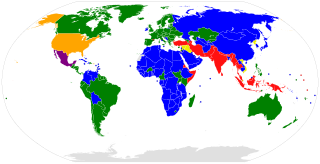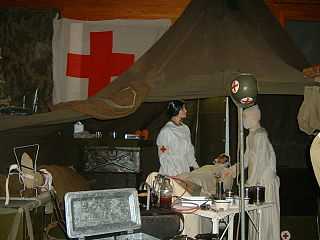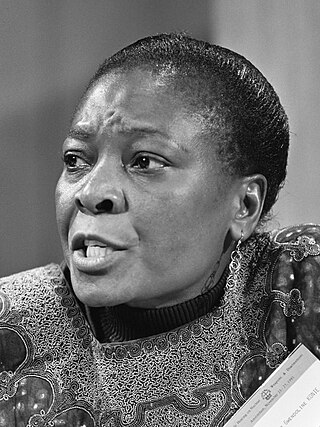Related Research Articles
International human rights instruments are the treaties and other international texts that serve as legal sources for international human rights law and the protection of human rights in general. There are many varying types, but most can be classified into two broad categories: declarations, adopted by bodies such as the United Nations General Assembly, which are by nature declaratory, so not legally-binding although they may be politically authoritative and very well-respected soft law;, and often express guiding principles; and conventions that are multi-party treaties that are designed to become legally binding, usually include prescriptive and very specific language, and usually are concluded by a long procedure that frequently requires ratification by each states' legislature. Lesser known are some "recommendations" which are similar to conventions in being multilaterally agreed, yet cannot be ratified, and serve to set common standards. There may also be administrative guidelines that are agreed multilaterally by states, as well as the statutes of tribunals or other institutions. A specific prescription or principle from any of these various international instruments can, over time, attain the status of customary international law whether it is specifically accepted by a state or not, just because it is well-recognized and followed over a sufficiently long time.

The Geneva Convention relative to the Protection of Civilian Persons in Time of War, more commonly referred to as the Fourth Geneva Convention and abbreviated as GCIV, is one of the four treaties of the Geneva Conventions. It was adopted in August 1949, and came into force in October 1950. While the first three conventions dealt with combatants, the Fourth Geneva Convention was the first to deal with humanitarian protections for civilians in a war zone. There are currently 196 countries party to the 1949 Geneva Conventions, including this and the other three treaties.

The law of war is the component of international law that regulates the conditions for initiating war and the conduct of hostilities. Laws of war define sovereignty and nationhood, states and territories, occupation, and other critical terms of law.
International humanitarian law (IHL), also referred to as the laws of armed conflict, is the law that regulates the conduct of war. It is a branch of international law that seeks to limit the effects of armed conflict by protecting persons who are not participating in hostilities and by restricting and regulating the means and methods of warfare available to combatants.

The International Convention on the Protection of the Rights of All Migrant Workers and Members of Their Families is a United Nations multilateral treaty governing the protection of migrant workers and families. Signed on 18 December 1990, it entered into force on 1 July 2003 after the threshold of 20 ratifying States was reached in March 2003. The Committee on Migrant Workers (CMW) monitors implementation of the convention, and is one of the seven UN-linked human rights treaty bodies. The convention applies as of September 2023 in 59 countries.
The Vienna Declaration and Programme of Action (VDPA) is a human rights declaration adopted by consensus at the World Conference on Human Rights on 25 June 1993 in Vienna, Austria. The position of United Nations High Commissioner for Human Rights was recommended by this Declaration and subsequently created by General Assembly Resolution 48/141.
Home Work Convention, created in 1996, is an International Labour Organization (ILO) Convention, which came into force in 2000. It offers protection to workers who are employed in their own homes.

Human rights are largely respected in Switzerland, one of Europe's oldest democracies. Switzerland is often at or near the top in international rankings of civil liberties and political rights observance. Switzerland places human rights at the core of the nation's value system, as represented in its Federal Constitution. As described in its FDFA's Foreign Policy Strategy 2016-2019, the promotion of peace, mutual respect, equality and non-discrimination are central to the country's foreign relations.

The Convention on the Nationality of Married Women is an international convention passed by the United Nations General Assembly in 1957. It entered into force in 1958 and as of 2013 it has 74 state parties.

The Geneva Conventions are international humanitarian laws consisting of four treaties and three additional protocols that establish international legal standards for humanitarian treatment in war. The singular term Geneva Convention colloquially denotes the agreements of 1949, negotiated in the aftermath of the Second World War (1939–1945), which updated the terms of the two 1929 treaties and added two new conventions. The Geneva Conventions extensively define the basic rights of wartime prisoners, civilians and military personnel; establish protections for the wounded and sick; and provide protections for the civilians in and around a war-zone.

Human rights in Cameroon are addressed in the constitution. However, the 2009 Human Rights Report by the United States Department of State noted concerns in regard to election irregularities, security forces torture and arbitrary arrests.
Reparations are broadly understood as compensation given for an abuse or injury. The colloquial meaning of reparations has changed substantively over the last century. In the early 1900s, reparations were interstate exchanges that were punitive mechanisms determined by treaty and paid by the surrendering side of conflict, such as the World War I reparations paid by Germany and its allies. Reparations are now understood as not only war damages but also compensation and other measures provided to victims of severe human rights violations by the parties responsible. The right of the victim of an injury to receive reparations and the duty of the part responsible to provide them has been secured by the United Nations.

Human rights in South Sudan are a contentious issue, owing at least in part to the country's violent history.
Military use of schools is a term used to refer to the various activities that national armed forces and non-state armed groups carry out in and around schools, universities, and other education facilities, in support of their military effort. Examples of this include using a school or a university as barracks or bases, for offensive or defensive deployments, for storage of weapons or ammunition, for military training of soldiers, as observation posts, and as a detention facility.
The term international framework of sexual violence refers to the collection of international legal instruments – such as treaties, conventions, protocols, case law, declarations, resolutions and recommendations – developed in the 20th and 21st century to address the problem of sexual violence. The framework seeks to establish and recognise the right all human beings to not experience sexual violence, to prevent sexual violence from being committed wherever possible, to punish perpetrators of sexual violence, and to provide care for victims of sexual violence. The standards set by this framework are intended to be adopted and implemented by governments around the world in order to protect their citizens against sexual violence.
Amīnah al-Saʿīd also known as Amīnah Saʻīd was an Egyptian journalist and women's rights activist. She founded Egypt's first women's magazine and was the first woman magazine editor in the Middle East.

Protected persons is a legal term under international humanitarian law and refers to persons who are under specific protection of the 1949 Geneva Conventions, their 1977 Additional Protocols, and customary international humanitarian law during an armed conflict.

Gwendoline Noreen Chomba Konie was a Zambian poet, diplomat and politician. She was the Zambian ambassador to Scandinavia, the United Nations and Germany. She formed her own party in 2000 and stood as a candidate to be the President of Zambia in 2001. When she died she was given a state funeral.
Isabel María Josefina Robalino Bolle was a Spanish-born Ecuadorian lawyer and politician.
The prohibition of torture is a peremptory norm in public international law—meaning that it is forbidden under all circumstances—as well as being forbidden by international treaties such as the United Nations Convention Against Torture.
References
- ↑ Kinnear, Karen L. (2011). Women in Developing Countries: A Reference Handbook. ABC-CLIO. p. 182. ISBN 9781598844252.
- ↑ Kinnear, Karen L. (2011). Women in Developing Countries: A Reference Handbook. ABC-CLIO. pp. 182–183. ISBN 9781598844252.
- ↑ Kinnear, Karen L. (2011). Women in Developing Countries: A Reference Handbook. ABC-CLIO. p. 183. ISBN 9781598844252.
- ↑ Kumar, Anuradha V. (2002). Encyclopaedia of Human Rights Development of Under Privileged, Volume 2. Sarup & Sons. p. 89. ISBN 9788176253246.